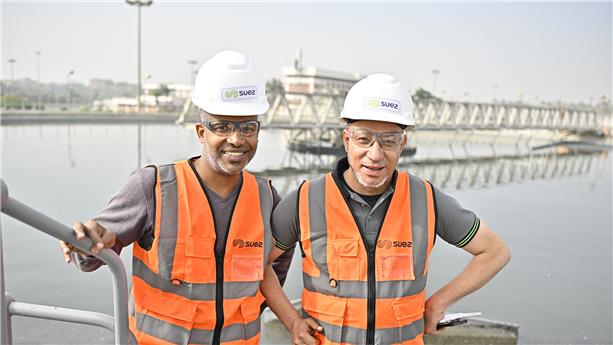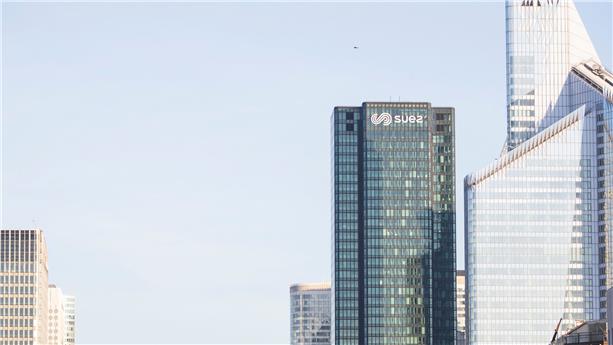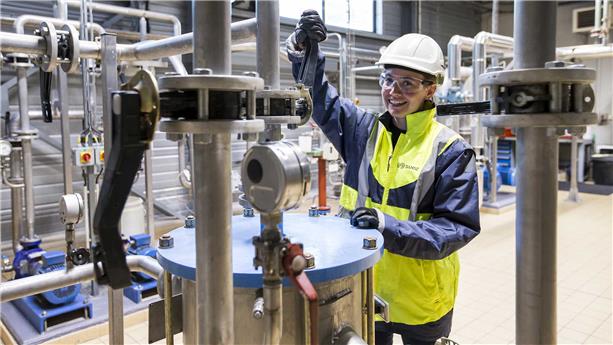
Direct access to your water management challenges
Our water management priorities to address the challenges relating to the environment
For more than 160 years, we have worked daily to improve the positive impact of our water operations. In the light of growing worldwide population and the scarcity of water resources, it is more important than ever to take action to protect our water.
We help our customers to provide access to essential water services such as producing drinking water and wastewater treatment, in order to guarantee access to sufficient and high quality water everywhere we operate. We devise innovative ways of protecting water resources, offering alternative solutions such as reusing treated wastewater, seawater desalination and energy recovery. At SUEZ, we firmly believe that our everyday efforts, focusing on our 5 priorities in terms of managing the water cycle will drive the energy transition.
More modern water treatment facilities
Upgrade existing facilities by developing more sustainable solutions in order to improve our water treatment infrastructure.
- Each day, we treat domestic wastewater from around 36 million people worldwide.
- We have 50 wastewater reuse projects currently under review in France.
Investing in seawater desalination
Converting seawater into drinking water is an alternative solution to increase water supply capacity in water-stressed regions.
- We have over 50 years’ experience and have built more than 260 desalination plants around the world.
Improving water infrastructure
Optimise water management systems by upgrading them: by repairing and replacing obsolete networks, and using digital solutions to increase yields and infrastructures’ ability to adapt.
- The equivalent of 8,878 Olympic-size swimming pools of water saved every year thanks to our digital leak detection solutions.
Low-carbon use of water in industry
Develop more sustainable and efficient water management solutions to reduce industry’s carbon footprint.
- In Pau-Lescar, the project to convert wastewater into biomethane will enable people living in Pau Béarn Pyrénées to have access to green, low-carbon energy.
Energy production
Converting sewage sludge from wastewater treated by means of methanisation into energy to supply our customers and users.
- We generate 7.7 terawatt hours of energy each year worldwide.
- In Europe, we supply electricity to more than 1.5 million people.
- In Nice, we are building an “energy positive” treatment plant, which will generate four times more energy than it currently uses.
Optimise the water life cycle
As a trusted partner for circular solutions, we draw on our in-depth knowledge of the water life cycle to provide you with operational and deployable solutions. These solutions aim to guarantee that water of sufficient quality and in sufficient quantities is available, optimise use of water and promote sustainable practices.

Innovation to adapt the water industry
We firmly believe that innovation is an essential way of making progress and standing out, and have doubled our investment to support sector transformation.
Thanks to the know-how of our 1,100 experts, our 1,700 patents and our 10 research centres, we take an active approach to research and development in areas such as alternative resources, removal of emerging contaminants (such as PFAS) and sludge treatment.
Our engineering and construction expertise means we are able to design new infrastructures and plants with lower greenhouse gas emissions, generating more resources for local regions.
We use robotics and artificial intelligence to devise new solutions for all stages of the water cycle, primarily to prevent leaks and, for example, increase yields from drinking water supply systems.
With partners such as Subeca, we have adopted an open innovation approach, working together to come up with solutions for our customers.
Finally, we work with our Le Lyre research and development centre, sociologists and behavioural economics experts and support behavioural innovation to encourage more responsible water consumption.
Contact us
Do not hesitate to contact us if you would like to know more about our water cycle management services. Our team will be happy to answer your questions and help you find the best solution for your needs.
Your questions about water management
On Earth, water can occur in three different states: solid (ice), liquid (water) and gas (water vapour). Its composition is the same, regardless of the state. However, the density and molecular structure of water can vary depending on its state. For example, water in the form of ice is denser than liquid water due to the crystalline structure of its molecules. Water in the form of vapour is less dense than liquid water because of the greater distance between its molecules. In addition, the temperature at which water changes state can affect the concentration of minerals and gases dissolved in the water, but this does not affect the fundamental composition of the water.
Water is no secret to us, thanks to our expert research centres.
Drinking water is clean water that is completely safe to drink. It is treated and disinfected to remove any contaminants and bacteria that may be present in the water when it is taken from its original environment.
A number of quality criteria ensure that water is fit for consumption. The most commonly used indicators include:
- turbidity, which measures water clarity;
- pH (potential of Hydrogen), which measures a solution’s acidity and alkalinity;
- chlorine level;
- presence of micro-organisms.
Complying with the standards set by supervisory bodies ensures that water is clean and safe to drink.
Drinking water quality standards in France are mainly aligned with those adopted throughout Europe. This is to ensure that protection of public health and the environment is consistent throughout the European Union (EU).
In France, for example, water treatment regulations are decided and implemented by the public authorities, in particular the Ministry of Health, the Ministry of Ecological Transition and Solidarity, the French Biodiversity Agency and the French Agency for Food, Environmental and Occupational Health and Safety (ANSES).
These authorities set drinking water quality standards that must be met by water distributors and water treatment plants. Drinking water quality criteria are reviewed regularly to take account of scientific advances and changes in legislation.
Local authorities also have an important role to play in water management and can set up management plans to protect local resources.
Outside the European Union, regulations vary according to each country’s national and regional regulations. National governments are responsible for setting water treatment standards and regulations on the basis of local needs and specificities.
In some cases, international organisation such as the World Health Organization (WHO) and the Food and Agriculture Organization of the United Nations (FAO) provide recommendations and guidelines on water treatment, which can be used as references by countries to draw up their own national regulations.
We cover the entire drinking water cycle, from drinking water production to drinking water distribution.
If the industry does not comply with current regulations, there is a risk that it may contribute to water pollution by discharging chemical products, solid waste or wastewater into watercourses and groundwater. These contaminants can have a harmful effect on aquatic flora and fauna, as well as drinking water quality. Toxic substances can also accumulate in the food chain and affect human health. In order to help ensure that human activity is sustainable, it is essential that wastewater is treated before it is discharged into the natural environment.
Industrial groups can reduce the amount of water used in their various processes in a number of ways, such as recycling water, reducing leaks and wastage, or even using rainwater and other alternative sources for certain activities.
We offer water management solutions for industry and business.
This pollution can have a devastating effect on ecosystems and human life. It can result in the destruction of marine habitat, decimate flora and fauna, and cause health problems in humans. Contaminated water can also cause diseases such as diarrhoea, cholera and typhoid fever.
Preventing water pollution primarily entails introducing strict environmental regulations to provide a framework for water treatment-related activities. However, prevention cannot be achieved solely by means of regulation. For every citizen to be able to help combat pollution, all members of the water industry are promoting environmentally friendly and sustainable practices such as reducing waste and responsible management of chemicals.
Find out more about the Pau-Lescar “Biofactory”, one of the wastewater decontamination solutions we offer.
There are several methods of irrigation, each of which presents its own advantages and disadvantages. Some are more expensive or use more water.
To reduce the amount of water used in agriculture, more efficient irrigation practices can be adopted such as localised irrigation or using precision technologies to adjust the quantity of water provided according to plants’ needs. Furthermore, the introduction of more sustainable farming practices such as crop rotation, soil management and using appropriate seeds can also help to reduce the amount of water used in agriculture.
Find out more about the wastewater recycling and agricultural irrigation water production plan implemented for the Milan region (Italy).








